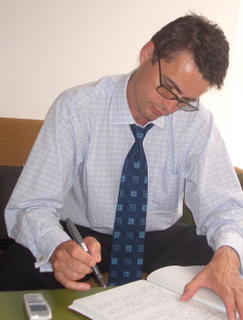It's great to see the pedestrian and bicycle lobby groups working together for the common good of sustainable transport options. The reported dramatic increase in bus and rail travel this month reflect the impact of petrol prices as well as new toll fees biting the hip pocket nerve. I find it inexplicable that the NRMA consistently takes the us and them, with us or against us approach to sharing our finite road infrastructure with all modes of transport. For the hard headed car drivers out there, the more people we get into public transport or on bicycles in dedicated cycle lanes - the more cars will be off your congested roads.
Media Release below.
 Tomorrow’s Summit Should be About Reducing Car-Dependency NOT Reducing Petrol Prices
Tomorrow’s Summit Should be About Reducing Car-Dependency NOT Reducing Petrol PricesThe Chairman of the Pedestrian Council, Mr Harold Scruby and BicycleNSW CEO, Mr Alex Unwin said that tomorrow’s NRMA Petrol Price Summit was focused on the wrong subject. The major issue facing our nation is not about reducing petrol prices, it’s about reducing car-dependency.
Mr Scruby said: “Nowhere in the NRMA’s literature have they mentioned anything about car-dependency. And they have not invited representatives from the public transport or active transport (walking and cycling) groups. This is all about keeping petrol prices low so we can have more cars on the road.
For the last 2 days, 2GB’s Alan Jones has spoken openly about the need for rational debate on this vital subject. Here are some quotes:
· “But we can't turn the petrol pricing debate over to the alarmists.
· “It is not the responsibility of government to make a scarce resource cheaper and oil/petrol is a finite resource.
· “If the higher petrol prices make us think about public transport rather than driving the car, that is no bad thing.
· “We need to drive less, drive more economically, share private transport and make better use of what public transport there is.”
· Mr Jones quoted Robert Samuelson, a member of the Washington Post Writers' Group: "What the United States needs is a petrol price of $4 to $5 a gallon. Now, America currently pay $2.80 a gallon, (or 95 cents a litre). What America needs most is ‘a steadily rising oil tax.’ Elsewhere he argued that the traditional US car companies, General Motors, Ford and Chrysler are the least prepared for change. He said, "They tied their fortunes to the biggest 4WDs and pick-ups, hence the need for a stiff oil tax."
Mr Unwin said: “The fuel crisis is a perfect opportunity to encourage the community to seek more economical (and healthier and more environmentally sustainable) means of active transport like walking and cycling.
“Bike transport is a viable, environmentally efficient and inexpensive mode of transport that will also result in better health and well-being. The issue is not petrol prices. It is educating Australians not to rely on motor vehicles; if we follow the European trend of using bikes as main form of transport, we would be a much healthier nation,” Alex Unwin said.
Mr Scruby added: “We must shake off our western culture arrogance and imagine the price of petrol and the effects of global warming, if the people of China and India were to be as car-dependent as us. Petrol prices would go through the roof and the bitumen would melt. We must start setting an example and reduce car-dependency immediately, before it’s too late.
“We therefore encourage all Australians to participate in Walk to Work Day on Friday 7 October 2005 and ‘Leave the Car at Home’.
See: www.walk.com.au
Mr Unwin said: “And for people wanting to try alternative forms of commuting, Portfolio Partners Sydney Spring Cycle on Sunday 23 October 2005.” See www.bicycle.nsw.org.au
CONTACT: Harold Scruby - (02) 9968-4555 or (0418) 110-011
Or Alex Unwin at Bicycle NSW on (02) 9281-4099 (0425) 221-060
Email: walking@walk.com.au or aunwin@bicyclensw.org.au

No comments:
Post a Comment